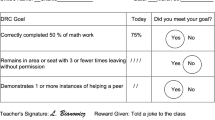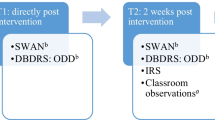Abstract
Daily Behavior Report Cards (DBRCs) have been found to decrease disruptive behaviors of children with attention-deficit/hyperactivity disorder, intellectual and developmental disorders, and typically developing students. However, although previous studies indicate that peers can assist with the implementation of a variety of interventions (e.g., Check in check out), teachers are often the implementer of DBRCs. In addition, it appears that no studies evaluating DBRCs have included a functional assessment. Thus, the purposes of this study were to assess the effects of a peer-mediated DBRC on disruptive classroom behaviors, determine whether peers could implement their portion of the intervention procedures with high integrity, and assess whether DBRC was effective independent of the functional reinforcer for disruptive behavior. In this study, peer-mediated DBRC led to a decrease in disruptive behavior and an increase in on-task behavior for all three target students who were at risk for EBD. The peer mediators also implemented the DBRC procedures with high integrity. Furthermore, DBRC was effective at suppressing disruptive behavior independent of their presumed functional reinforcer. However, it does appear that different portions of the intervention likely addressed the hypothesized functions of problem behaviors of all three participants.


Similar content being viewed by others
References
Albin, R. W., Lucyshyn, J. M., Horner, R. H., & Flannery, K. B. (1996). Contextual fit for behavioral support plans: A model for “goodness of fit”. In L. K. Koegel, R. L. Koegel, & G. Dunlap (Eds.), Positive behavioral support: Including people with difficult behavior in the community (pp. 81–98). Baltimore: Paul H. Brookes.
Arceneaux, M. C., & Murdock, J. Y. (1997). Peer prompting reduces disruptive vocalizations of a student with developmental disabilities in a general eighth-grade classroom. Focus on Autism and Other Developmental Disabilities, 12(3), 182–186. https://doi.org/10.1177/108835769701200307.
Benazzi, L., Horner, R. H., & Good, R. H. (2006). Effects of behavior support team composition on the technical adequacy and contextual fit of behavior support plans. The Journal of Special Education, 40, 160–170. https://doi.org/10.1177/00224669060400030401.
Campbell, A., & Anderson, C. (2008). Enhancing effects of Check-in/Check-out with function based support. Behavioral Disorders, 33, 233–245. https://doi.org/10.1177/019874290803300404.
Chafouleas, S. M., Riley-Tillman, T. C., & Christ, T. J. (2009). Direct behavior rating: An emerging method for assessing social behavior within a tiered intervention system. Assessment for Effective Intervention, 34, 195–200. https://doi.org/10.1177/1534508409340391.
Charlop, M. H., Schreibman, L., & Tryon, A. S. (1983). Learning through observation: The effects of peer modeling on acquisition and generalization in autistic children. Journal of Abnormal Child Psychology, 11, 355–366. https://doi.org/10.1007/bf00914244.
Collins, T. A., Gresham, F. M., & Dart, E. H. (2016). The effects of peer-mediated check-in/check-out on the social skills of socially neglected students. Behavior Modification, 40, 568–588. https://doi.org/10.1177/0145445516643066.
Crone, D. A., & Horner, R. H. (2003). Building positive behavior support systems in schools: Functional behavior assessment. New York, NY: Guilford.
Davis, S., Thomson, K., & Connolly, M. A. (2019). A component analysis of behavioral skills training with volunteers teaching motor skills to individuals with developmental disabilities. Behavioral Interventions, 34, 431–450. https://doi.org/10.1002/bin.1688.
Dougherty, E. H., & Dougherty, A. (1977). The daily report card: A simplified and flexible package for classroom behavior management. Psychology in the Schools, 14, 191–195. https://doi.org/10.1002/1520-6807.
Fabiano, G. A., Vujnovic, R. K., Pelham, W. E., Waschbusch, D. A., Massetti, G. M., Pariseau, M. E., et al. (2010). Enhancing the effectiveness of special education programming for children with attention deficit hyperactivity disorder using a daily report card. School Psychology Review, 39, 219. https://doi.org/10.1177/1534508409333344.
Fairbanks, S., Sugai, S., Guardino, D., & Lathrop, M. (2007). Response to intervention: An evaluation of a classroom system of behavior support for second grade students. Exceptional Children, 73, 288–310. https://doi.org/10.1177/001440290707300302.
Grayson, J. L., & Alvarez, H. K. (2008). School climate factors relating to teacher burnout: A mediator model. Teaching and Teacher Education, 24, 1349–1363. https://doi.org/10.1016/j.tate.2007.06.005.
Harper, C. B., Symon, J. B., & Frea, W. D. (2008). Recess is time-in: Using peers to improve social skills of children with autism. Journal of Autism and Developmental Disorders, 38, 815–826. https://doi.org/10.1007/s10803-007-0449-2.
Iznardo, M., Rogers, M. A., Volpe, R. J., Labelle, P. R., & Robaey, P. (2020). The effectiveness of daily behavior report cards for children with ADHD: A meta-analysis. Journal of Attention Disorders, 24(12), 1623–1636. https://doi.org/10.1177/1087054717734646.
Jurbergs, N., Palcic, J. L., & Kelley, M. L. (2010). Daily behavior report cards with and without home-based consequences: Improving classroom behavior in low income, African American children with ADHD. Child & Family Behavior Therapy, 32, 177–195. https://doi.org/10.1080/07317107.2010.500501.
Kauffman, J. M. (1997). Characteristics of emotional and behavioral disorders of children and youth. Upper Saddle River, NJ: Merrill/Prentice Hall. https://doi.org/10.4324/9780203117378.ch2.
LeBel, T. J., Chafouleas, S. M., Britner, P. A., & Simonsen, B. (2013). Use of a daily report card in an intervention package involving home-school communication to reduce disruptive behavior in preschoolers. Journal of Positive Behavior Interventions, 15, 103–112. https://doi.org/10.1177/1098300712440451.
Martens, B. K., Witt, J. C., Elliott, S. N., & Darveaux, D. X. (1985). Teacher judgments concerning the acceptability of school-based interventions. Professional Psychology: Research and Practice, 16, 191–198. https://doi.org/10.1037/0735-7028.16.2.191.
Miltenberger, R. G., Flessner, C., Gatheridge, B., Johnson, B., Satterlund, M., & Egemo, K. (2004). Evaluation of behavioral skills training to prevent gun play in children. Journal of Applied Behavior Analysis, 37, 513–516. https://doi.org/10.1901/jaba.2004.37-513.
Murray, D. W., Rabiner, D., Schulte, A., & Newitt, K. (2008). Feasibility and integrity of a parent–teacher consultation intervention for ADHD students. Child & Youth Care Forum, 37, 111. https://doi.org/10.1007/s10566-008-9054-6.
O’Neill, R., Horner, R. H., Albin, R. W., Sprague, J. R., Storey, K., & Newton, J. S. (1997). Functional assessment for problem behaviors: A practical handbook (2nd ed.). Pacific Grove, CA: Brooks/Cole.
O’Neill, R. E., Homer, R. H., Albin, R. W., Storey, K., & Sprague, J. R. (1990). Functional analysis of problem behavior: A practical assessment guide. Sycamore, IL: Sycamore Press.
Owens, J. S., Holdaway, A. S., Zoromski, A. K., Evans, S. W., Himawan, L. K., Girio-Herrera, E., et al. (2012). Incremental benefits of a daily report card intervention over time for youth with disruptive behavior. Behavior Therapy, 43, 848–861. https://doi.org/10.1016/j.beth.2012.02.002.
Pierce, C. D., Reid, R., & Epstein, M. H. (2004). Teacher-mediated interventions for children with EBD and their academic outcomes: A review. Remedial and Special Education, 25, 175–188. https://doi.org/10.1177/07419325040250030501.
Riden, B. S., Taylor, J. C., Lee, D. L., & Scheeler, M. C. (2018). A synthesis of the daily behavior report card literature from 2007 to 2017. The Journal of Special Education Apprenticeship, 7(1), 1–28.
Riley-Tillman, T. C., Chafouleas, S. M., & Briesch, A. M. (2007). A school practitioner’s guide to using daily behavior report cards to monitor student behavior. Psychology in the Schools, 44, 77–89. https://doi.org/10.1002/pits.20207.
Ryan, J. B., Reid, R., & Epstein, M. H. (2004). Peer-mediated intervention studies on academic achievement for students with EBD: A review. Remedial and Special Education, 25, 330–341. https://doi.org/10.1177/07419325040250060101.
Smith, R. G., Russo, L., & Le, D. D. (1999). Distinguishing between extinction and punishment Effects of response blocking: A replication. Journal of Applied Behavior Analysis, 32, 367–370. https://doi.org/10.1901/jaba.1999.32-367.
Taylor, J. C., & Hill, D. (2017). Using daily behavior report cards during extended school year services for young students with intellectual and developmental disabilities. Education and Treatment of Children, 40, 525–546. https://doi.org/10.1353/etc.2017.0023.
Vannest, K. J., Davis, J. L., Davis, C. R., Mason, B. A., & Burke, M. D. (2010). Effective intervention for behavior with a daily behavior report card: A meta-analysis. School Psychology Review, 39, 654–672.
Vollmer, T., Roane, H., Ringdahl, J., & Marcus, B. (1999). Evaluating treatment challenges with differential reinforcement of alternative behavior. Journal of Applied Behavior Analysis, 32(1), 9–23. https://doi.org/10.1901/jaba.1999.32-9.
Ward-Horner, J., & Sturmey, P. (2012). Component analysis of behavior skills training in functional analysis. Behavioral Interventions, 27, 75–92. https://doi.org/10.1002/bin.1339.
Worthington, L. A., & Gargiulo, R. M. (2003). Persons with emotional or behavioral disorders. In R. M. Gargiulo (Ed.), Special education in contemporary society. An introduction to exceptionality. Stamford: Thompson Learning Inc.
Acknowledgements
A thesis submitted in partial fulfillment of the requirements for the degree of Master of Science in Applied Behavior Analysis at the University of South Florida. This research was supported in part by Project EBAS (H325K170085), grant funded by the US Department of Education, Office of Special Education Programs. The authors thank Andrea Zuniga, Jacy Reed, Mollie McDermit, and Thomas Schulz for their assistance with various aspects of this study.
Author information
Authors and Affiliations
Corresponding author
Ethics declarations
Conflict of interest
The authors declare that they have no conflict of interest.
Ethical Approval
All procedures performed in studies involving human participants were in accordance with the ethical standards of the institutional and/or national research committee (including name of committee + reference number) and with the 1964 Helsinki declaration and its later amendments or comparable ethical standards.
Informed Consent
Informed consent was obtained from all individual participants included in the study.
Additional information
Publisher's Note
Springer Nature remains neutral with regard to jurisdictional claims in published maps and institutional affiliations.
Electronic supplementary material
Below is the link to the electronic supplementary material.
Rights and permissions
About this article
Cite this article
Canfield, D., Cividini-Motta, C. The Effects of a Daily Behavior Report Card Intervention: Inclusion of a Peer Mediator. J Behav Educ 31, 614–634 (2022). https://doi.org/10.1007/s10864-020-09416-z
Accepted:
Published:
Issue Date:
DOI: https://doi.org/10.1007/s10864-020-09416-z




